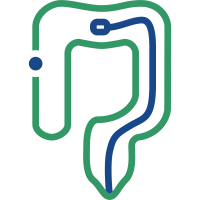Endoscopic Procedures
Our unit performs gastroscopies, colonoscopies, ERCP, EUS, enteroscopy, enteral stent insertion, endoscopic tissue resection (EMR & ESD) and POEM. Please see below for further information on these procedures.
We work with skilful, experienced and caring nursing staff and other clinical support staff to help us achieve the high level of endoscopic expertise that we offer to all patients.
Click here for fasting and bowel preparation instructions for your procedures.
A gastroscopy is performed to examine the upper digestive tract; this includes the oesophagus, stomach and start of the small intestine. The gastroscopy will investigate symptoms such as swallowing difficulties, upper abdominal pain, heartburn, loss of weight and anaemia. Biopsy samples may be taken during the procedure and examined under a microscope. The procedure is performed under sedation after fasting. You cannot drive home after the procedure. Complications from the procedure are very uncommon and include perforation, bleeding, anaesthetic complications and missed lesions.

A colonoscopy is performed to examine the lower digestive tract, particularly the bowel and end of the small bowel. This may be to investigate symptoms such as diarrhoea, rectal bleeding, abdominal pain or weight loss. Colonoscopy can also be used to look for polyps (growths of tissue) or cancers in asymptomatic patients. Some further diagnostic (biopsies to examine under a microscope) and therapeutic procedures (removal of polyps, treatment of bleeding etc) can also be performed through the colonoscope. The procedure is performed under sedation after drinking bowel preparation to clear the bowel. You cannot drive home after the procedure. Complications from the procedure are very uncommon and include perforation, bleeding, anaesthetic complications and missed lesions.

Interventional Endoscopy – ERCP, EUS, Enteroscopy, Enteral Stent Insertion, EMR, ESD, POEM
Interventional endoscopy involves more specialised and complicated procedures that can treat or diagnose conditions in a minimally invasive manner. These procedures include
- ERCP (Endoscopic retrograde cholangiopancreatoscopy)
- for treatment and management of bile duct and pancreatic issues such as gallstones, blockages and cancer
- EUS (Endoscopic ultrasound)
- for diagnosis of cancers of the bile ducts, pancreas and gallbladder
- Enteroscopy
- for examination of the small bowel
- Enteral stent insertion
- for treatment of narrowing or blockages of the oesophagus, stomach and bowel
- Endoscopic tissue resection – EMR and ESD
- for removal of cancerous or precancerous growths ( polyps) on the lining of the oesophagus, stomach, small bowel, large bowel, and rectum
- Per oral endoscopic myotomy (POEM)
- minimal invasive management of Achalasia and other oesophageal motility conditions
Through the use of these advanced techniques, patients can benefit through avoiding surgery or more invasive medical procedures. All our interventional endoscopy staff have extensive training with national and international experience in the procedures that they perform.


